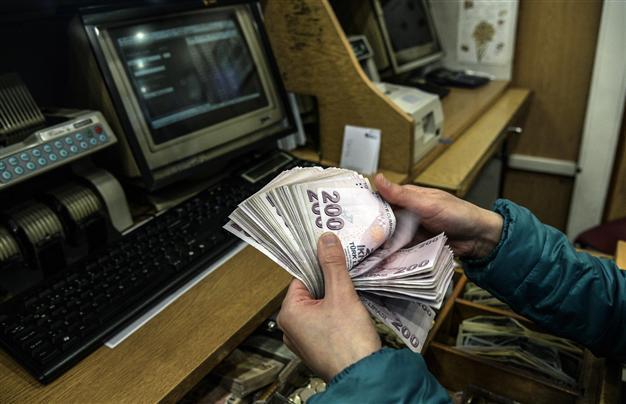Turkish markets moody after Erdoğan’s election victory
ISTANBUL - Reuters

AFP Photo
The Turkish Lira and stocks began the week with gains after Prime Minister Recep Tayyip Erdoğan won the country’s first direct presidential election, but assets suddenly started dropping with the dollar/lira ratio rising above 2.15, while the main stock index retreated below 79,000 points.
Turkish assets began the trading day strong as the lira had strengthened to 2.1351 against the dollar from 2.1601 late on Aug. 8 and Borsa Istanbul 100 index rose over 1.6 percent to over 80,000 points.
However, the currency and stocks rapidly began to decline in the morning session, as the investor optimism that affected markets in the morning has reversed.
The lira eased back to around 2.154 by around 12:10 p.m., while the main Istanbul share index dropped by more than 1 percent to around 78,300 points. The benchmark 2-year government bond’s yield had fallen to 9.23 percent from 9.36 on Aug.8.
Erdoğan’s victory was taken as a sign of continuity at first, but analysts also warned of medium-term risks to economic predictability emerging from the concentration of power.
Attention is now turning to the appointment of a new prime minister and economic management team, analysts say. Markets will be looking for any changes among the main figures on the economic team, such as Deputy Prime Minister Ali Babacan.
“We expect that the market will refocus on the composition of the Cabinet, with the absence of key figures such as Ali Babacan - well-regarded by market participants and thus far central in the promotion of sound economic policy in Turkey - likely to catalyze a marked deterioration in Turkish assets on investor concern over the future trajectory of economic policy-making,” Phoenix Kalen, a London-based strategist at Societe Generale, wrote by e-mail on Aug. 11.
But in the long term there are concerns about concentration of power in the hands of a sometimes impulsive leader and the erosion of key checks and balances in the system, according to some analysts. Erdoğan has vowed to exercise the full powers granted to the presidency under current laws, unlike his predecessors.
“The presidency has until now been a largely ceremonial position, but it seems that Mr. Erdoğan will seek to concentrate more power in the role. If this happens, his victory could lead to a more belligerent and unpredictable policymaking environment,” said William Jackson, Capital Economics emerging markets economist. “In time, a deterioration in the predictability of policymaking and, more generally, institutional standards in Turkey would deter investors and make it more difficult to attract capital inflows.”
Erdoğan had been insisting on lower interest rates before the election, raising concern over the Central Bank’s independence. He says high interest rates cause high inflation and has repeatedly accused an “interest rate lobby” of speculators of pushing for higher rates and seeking to undermine the Turkish economy.
The Central Bank has already cut its main one-week repo rate by 175 points since May, moves which some economists see as hard to justify given persistently high inflation.
“The pressure on the Central Bank to ease monetary policy will persist. Erdogan had been quite vocal regarding the necessity to cut interest rates and he will continue to be so,” said Thu Lan Nguyen, a currency strategist at Commerzbank.
“The likely continuation of the rate-cut cycle will put pressure on the lira, particularly when monetary policy in the U.S. is normalized.”
Turkey is susceptible to changes in global liquidity conditions because of its large current account deficit.
